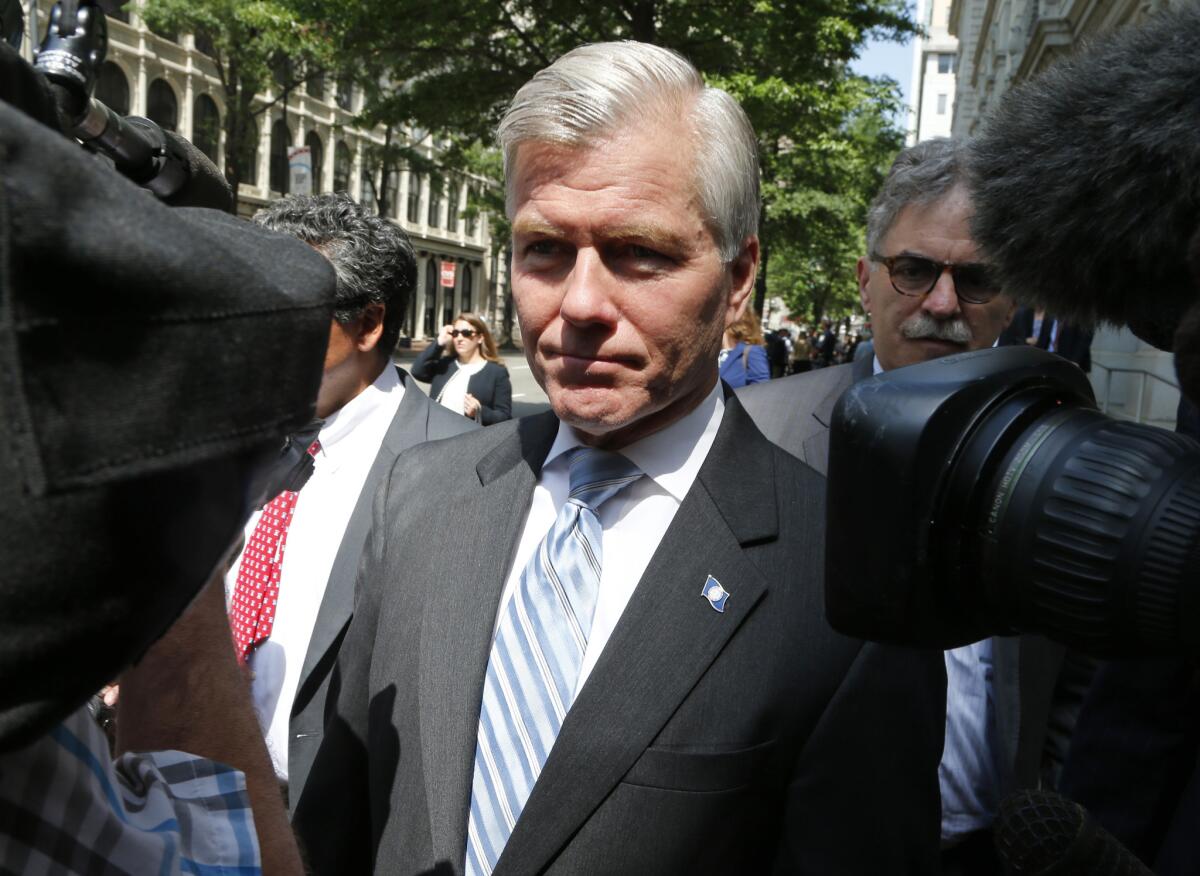Supreme Court may make prosecuting bribery cases against public officials tougher

Former Virginia Gov. Bob McDonnell navigates a group of cameras as he leaves the 4th U.S. Circuit Court of Appeals after a hearing the appeal of his corruption conviction in Richmond, Va., last May.
- Share via
Reporting from Washington — The Supreme Court justices strongly hinted Wednesday they will make it much harder to prosecute public officials who take money from wealthy people and provide access to the upper reaches of government.
The justices, both conservative and liberal, said they doubted an official can be convicted of bribery if he or she simply arranged special meetings in exchange for cash or gifts.
Their reaction appeared to surprise a veteran Justice Department attorney. It would be “absolutely stunning” if the high court were to approve a “pay-to-play theory of government (so that) people can pay for access,” said Deputy Solicitor Gen. Michael Dreeben. It “would send a terrible message to citizens.”
The exchange came as the justices heard an appeal on behalf of former Virginia Gov. Robert McDonnell, a Republican who was convicted of secretly taking $175,000 in cash and gifts from a wealthy businessman who wanted the state’s help in promoting a dietary supplement made of tobacco.
McDonnell’s lawyers argued he did little in exchange for the gifts, other than set up meetings at the governor’s mansion with state health officials and university researchers.
The governor did not “cross the line” to commit a crime, attorney Noel Francisco argued, because he did not order or pressure state officials to fund research on the dietary supplement.
That argument won favor with Chief Justice John G. Roberts Jr. and Justice Stephen G. Breyer.
Roberts asked about a governor who goes trout fishing with a CEO to talk about locating a new plant in his state. “Now, is that a felony?” he asked.
No, Dreeben said, but it might be a crime if the governor accepts a free trip to Hawaii for himself and his family in exchange for helping the businessman.
Breyer said elected officials go to lunches all the time and then write favorable letters for constituents. He said he worried about giving prosecutors too much power to treat small favors as crimes.
“This is a recipe for giving the Justice Department and the prosecutors enormous power over elected officials,” he said.
It is not, Dreeben said. But it is “a recipe for corruption” if the court upholds “paying for access,” he added.
No one disputes that McDonnell and his wife took loans, luxury gifts and all-expenses-paid vacations from Jonnie Williams, the Virginia businessman. And all agree the governor set up several meetings where state health officials and university researchers listened to promotions touting the benefits of the dietary supplement.
But in the end, the state and its universities did not fund research on the supplement Williams was promoting.
The bribery laws make it a crime for a public official to take something of value “corruptly in return for being influenced in the performance of any official act.”
Prosecutors alleged the former governor took “official acts” by repeatedly contacting state employees and urging them to take a close look at the supplement. A jury found McDonnell guilty on 11 counts, and he was sentenced to two years in prison.
But most of the justices who spoke Wednesday said they doubted that these contacts and meetings amounted to “official acts.”
Only Justices Sonia Sotomayor and Ruth Bader Ginsburg appeared to side with the Justice Department prosecutors.
“If we read this statute as you are urging,” Ginsburg told McDonnell’s lawyer, “then every government official can say: ‘You want to have a meeting? Pay me a $1,000.’ That’s your view, and that would be OK?”
If “it really is just a meeting, yes,” he replied.
The argument suggested the case of McDonnell vs. United States could be one of the most important of the term. At one point, the chief justice suggested the court might strike down the entire bribery statute because it is vague.
If the eight justices were to split 4-4, the tie vote would uphold the conviction and send McDonnell to prison. But it sounded as though a majority would vote to reverse the conviction and narrow the law so that bribery charges will require proof that an official took a specific government action in return for a pay off.
Twitter: @DavidGSavage
ALSO
The long, strange odyssey of the ‘Barefoot Bandit’ just got stranger
Supreme Court strengthens free-speech rights of public employees
A Trump-Clinton general election poses a question: Who does America hate least?
More to Read
Sign up for Essential California
The most important California stories and recommendations in your inbox every morning.
You may occasionally receive promotional content from the Los Angeles Times.














